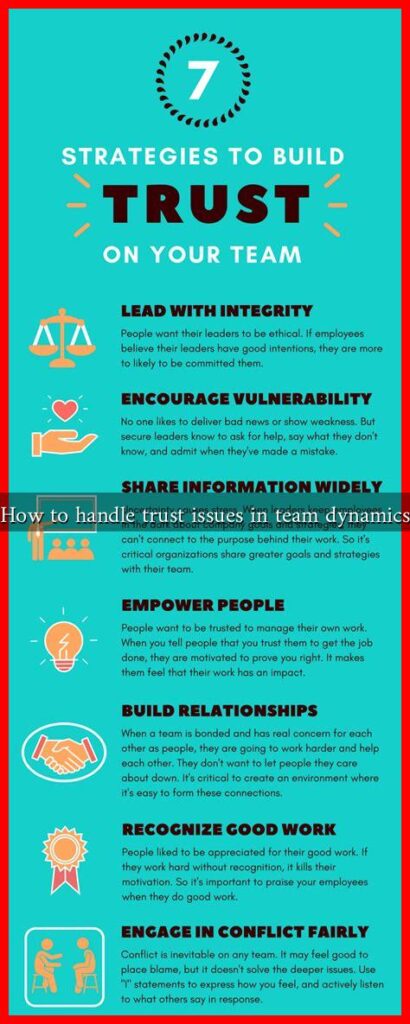-
Table of Contents
- How to Handle Trust Issues in Team Dynamics
- Understanding Trust Issues in Teams
- Strategies for Building Trust in Teams
- 1. Foster Open Communication
- 2. Establish Clear Roles and Responsibilities
- 3. Promote Team-Building Activities
- 4. Lead by Example
- Case Study: Trust Issues at a Tech Startup
- Measuring Trust in Teams
- Conclusion: The Path to Trust
How to Handle Trust Issues in Team Dynamics
Trust is the cornerstone of effective teamwork. When team members trust one another, collaboration flourishes, communication improves, and productivity soars. However, trust issues can arise for various reasons, leading to dysfunction and conflict within a team. This article explores how to identify, address, and ultimately overcome trust issues in team dynamics.
Understanding Trust Issues in Teams
Trust issues can manifest in numerous ways, including lack of communication, reluctance to share ideas, and a general atmosphere of suspicion. According to a study by the Institute for Corporate Productivity, 75% of employees believe that trust is essential for a successful team. When trust is compromised, it can lead to:
- Decreased morale
- Increased turnover rates
- Lower productivity
- Heightened conflict
Recognizing the signs of trust issues is the first step toward resolution. Common indicators include:
- Frequent misunderstandings
- Reluctance to share information
- Defensive behavior during feedback sessions
- Increased gossip or negative talk
Strategies for Building Trust in Teams
Addressing trust issues requires a proactive approach. Here are several strategies that can help rebuild trust within a team:
1. Foster Open Communication
Encouraging open dialogue is crucial for building trust. Team members should feel safe expressing their thoughts and concerns without fear of judgment. Regular check-ins and feedback sessions can facilitate this process. For example, Google’s Project Aristotle found that psychological safety—where team members feel safe to take risks—was a key factor in high-performing teams.
2. Establish Clear Roles and Responsibilities
Ambiguity can breed mistrust. Clearly defining roles and responsibilities helps team members understand their contributions and how they fit into the larger picture. This clarity can reduce friction and promote accountability.
3. Promote Team-Building Activities
Engaging in team-building exercises can strengthen relationships and foster trust. Activities that require collaboration, such as problem-solving challenges or social outings, can help team members bond and develop mutual respect.
4. Lead by Example
Leadership plays a pivotal role in establishing a culture of trust. Leaders should model trustworthy behavior by being transparent, admitting mistakes, and showing vulnerability. A study by the American Psychological Association found that leaders who demonstrate trustworthiness can significantly enhance team dynamics.
Case Study: Trust Issues at a Tech Startup
Consider the case of a tech startup that faced significant trust issues among its development team. The team was divided, with members reluctant to share code and ideas due to fears of criticism. To address this, the leadership implemented weekly brainstorming sessions where all ideas were welcomed, and constructive feedback was encouraged. Over time, this initiative led to improved collaboration and a 30% increase in project completion rates.
Measuring Trust in Teams
To effectively manage trust issues, it’s essential to measure the level of trust within the team. Surveys and feedback tools can provide insights into team dynamics. Tools like the Trust Index by Great Place to Work can help gauge employee perceptions of trust and identify areas for improvement.
Conclusion: The Path to Trust
Trust issues in team dynamics can be challenging, but they are not insurmountable. By fostering open communication, establishing clear roles, promoting team-building activities, and leading by example, teams can rebuild trust and enhance their overall effectiveness. Remember, trust is not built overnight; it requires consistent effort and commitment from all team members. By prioritizing trust, teams can create a more collaborative, productive, and positive work environment.
For further reading on building trust in teams, consider exploring resources from the Gallup Organization.

